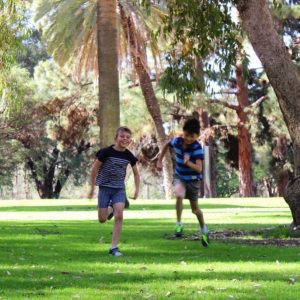How Time in Nature Improves Kids’ Body Image
We know nature is good for us, both physically and mentally, and new research from Anglia Ruskin University takes this idea even further, finding that exposure to green spaces and natural environments has a strongly positive effect on body image.
Anyone with a teenager (or anyone who’s ever been one) understands the issues young people experience around body image. No longer childlike but not yet adult bodies grow in fits and starts, where everything seeming simultaneously too big and too small, and self-comparison with peers often creates feelings of inadequacy.
With media images of body perfection more and more pervasive, it’s no wonder that teenagers (and even younger children) are critical of their bodies.
“It might be that it [nature] distances people, physically and mentally, from appearance-focused situations that are one of the causes of negative body image.
When I was a teenager in the 90s, the worst images I had to deal with when navigating my own body doubts were super models in fashion magazines (and they were more Amazon than waif) and Adriana Xenides’ unimaginably long legs strutting in front of the answer board on The Price is Right as she spun the letter tiles in response to a correct guess (“I’ll take P for Peter thanks John!”).
The concepts of pro-ana, thigh gap and bikini bridge were non-existent, as were “body inspo” images now so common on social media.
Now, our kids are bombarded with a constant stream of air-brushed, photoshopped, cropped, curated imagery showing bodies only at their very best/fittest/most beautiful, with full hair and makeup thrown into the bargain. One shining light in the dark who combats this scourge is the delightfully hilarious Celeste Barber, who mimics celebrity’s perfect Instagram posts, with a healthy dose of reality. But as refreshing as Barber is for a world-weary (nearly) middle aged mother of three, she’s not necessarily as readily embraced by teenagers.

Viren Swami, Professor of Social Psychology at Anglia Ruskin University and lead author of the study, said: “There are several reasons why exposure to nature could be having this effect on positive body image. It might be that it distances people, physically and mentally, from appearance-focused situations that are one of the causes of negative body image.
“It is also possible that exposure to environments with depth and complexity restricts negative appearance-related thoughts. More specifically, natural environments effortlessly hold your attention — a process known as ‘soft fascination’. This is often accompanied by feelings of pleasure, such as when you are drawn to the sight of a setting sun.
“An environment that does not require undivided attention may provide people with cognitive quiet, which in turn may foster self-compassion such as respecting your body and appreciating it is part of a wider ecosystem requiring protection and care.
“Access to nature may also mean that individuals spend more time outdoors engaging in activities that focus attention on the body’s functionality rather than aesthetics.”
A concept I have imparted to my children (now aged 16, 14 and 4) is that it’s not important what your body looks like, it’s how you use it that’s important. Do you challenge your body in new and exciting ways? Do you reach higher, stretch further and push the limits of what you’re able to do? Do you fail and get back up and try again?
It’s not a fail-safe to guard against negative body image, but it is a great way to remind our kids that they’re more than their looks, more than a number on a scale, and more than the number of likes on a selfie.
Want to see more research about the benefits of nature play? Visit our Research section.
Research information and quotes from Professor Swami provided sourced from Anglia Ruskin University.

